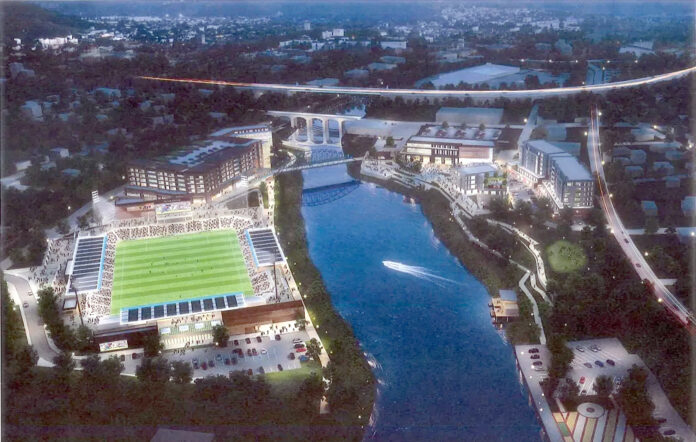
PAWTUCKET – The soccer stadium that would anchor a proposed riverfront development in Pawtucket could leave the state $52 million in the hole after 20 years of operation, according to newly released financial estimates.
The state has agreed to borrow $59 million to help pay for the Tidewater Landing project, nearly all of which will be used to build the soccer stadium under a controversial financing package approved by R.I. Commerce Corp. The plan is for the tax revenue generated from the project to pay back the bonds.
But the soccer stadium will only bring in $6.9 million in taxes over the life of the 20-year bond, leaving a $52 million gap between what the state borrowed and what it will have to pay back by 2042, according to documents. The analysis by financial consultant MuniCap was made public after an open records request by The Boston Globe. PBN obtained the analysis on Friday.
The estimates do not align with the bold promises of economic transformation that project partners have touted the development will bring to Pawtucket and the state.
The original tax-increment financing deal approved for the project called for using city and state bonds to pay for various public infrastructure during multiple phases of the project. The mixed-use development also includes housing, office and retail space along with infrastructure upgrades such as a pedestrian bridge connecting the two sites on either side of the Pawtucket River.
But after inflation and supply chain problems sent project costs soaring, developer Fortuitous Partners said it needed more of that public funding upfront for the stadium. The reworked financing deal, which was narrowly approved by R.I. Commerce Corp. in July, uses nearly all of the $59 million in tax-increment financing for the stadium, reserving just $1.5 million for any later phases of the project.
Critics quickly spoke out, questioning what ensures that the rest of the project will ever happen without more state money. Tidewater has already upped the price tag for the total project – now at $344 million versus the original $284 million – but also said it needs to do more analysis to know the true cost and timeline for the entire project.
The $124 million stadium, which broke ground with a ceremony on Aug. 12, is projected to open in 2024. In its first full year, in 2025, the United Soccer League stadium could generate $271,965 in tax revenue, which includes sales and use, personal income and business corporation taxes, according to MuniCap’s analysis. The state will pay $2.9 million on its debt service that year.
By 2042, the final year of the projected state bond repayment, the annual debt service rises to $3.7 million. But the stadium will only make $373,591 in annual tax revenue.
The debt payments are based on hypothetical terms, since the bonds have not been issued yet but assume a November issuing date with a 20-year term and 5.5% interest.
The analysis also has some details about what a 30-year bond would entail, predicting a 5% interest rate, although there is no corresponding timeline for what the state’s annual payments would be under the longer time frame.
Municap’s analysis shows an extra 10 years brings up the stadium revenue to $11.5 million, which still falls well short of the $59 million bond.
Analysis by a separate consulting firm, CSL Consulting, paints a slightly better picture, with $14.8 million in direct tax revenue from the stadium over 30 years, as first reported by WPRI-TV CBS 12. When including indirect revenue, the stadium will generate $37 million over the first 30 years, according to CSL.
CSL called the financing plan “slightly aggressive but achievable.”
In any of these scenarios, the state is taking on more debt than it can expect to earn back. How the state will bridge that funding gap is unclear. R.I. Commerce did not immediately respond to inquiries for comment about the analyses.
Separate from the state bonds, the city of Pawtucket is also borrowing $19 million in a similar tax-increment financing deal. The project has also been approved for $10 million in net state tax credits.
Nancy Lavin is a PBN staff writer. You may reach her at Lavin@PBN.com.












Thank you, Dan McKee and Stefan Pryor.